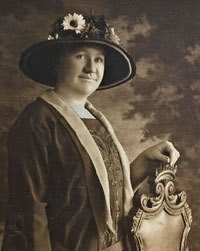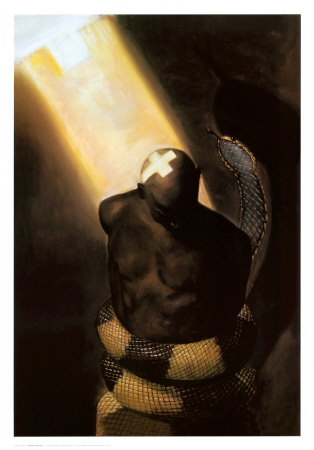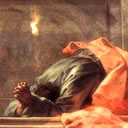Johanna Veenstra - Part 2
 “She was very conscious of her weakness and unworthiness, but determined that He should conquer in her life. She believed in the Senior-partnership of the Holy Ghost. He knew the country to be taken; and though stone walls or giants defied her, He was equal for all. If she spent time enough in His presence, He would reveal His plans to her. Only in implicit obedience to His commands, she knew victory could be expected. So, like Joshua, she would fall down before the Captain of the host and say, “What saith my Lord unto His servant?” And she was yielded to follow His leading, even though it often crossed her own inclinations.”
“She was very conscious of her weakness and unworthiness, but determined that He should conquer in her life. She believed in the Senior-partnership of the Holy Ghost. He knew the country to be taken; and though stone walls or giants defied her, He was equal for all. If she spent time enough in His presence, He would reveal His plans to her. Only in implicit obedience to His commands, she knew victory could be expected. So, like Joshua, she would fall down before the Captain of the host and say, “What saith my Lord unto His servant?” And she was yielded to follow His leading, even though it often crossed her own inclinations.”
When the battle raged strong and Satan seemed to triumph over the souls of those she had watched over, she would keep a night's vigil. Prayer to her was spiritual warfare. She could wage a relentless battle against the powers of darkness by these spiritual weapons. Johanna trained souls to be spiritual warriors like herself. One little widow in particular was known to the villagers as “The Daughter of Prayer”. In the prayer meetings this woman would supplicate the Throne with tears running down her checks for the ones who had grown cold toward the Lord she loved. Sometimes the body of the intercessor would be bent to the earth, her face buried in her clasped hands. She prayed aloud morning, noon and night for the surrounding tribes and missionary stations. Although unable to read a word of the Bible, yet she was learned in the heavenly art of taking spoils from the enemy by prevailing prayer.
Saturday was always a sacred preparation day for the Sabbath. Nothing is allowed to interfere with this time alone with the Lord. Even the most tantalizing post would be laid aside until Monday if it should arrive on Saturday, and visitors were asked not to make their calls at the week-ends.
In the course of her years of service, Johanna was aided from time to time by helpers from other stations, all agreeing that she was a superior missionary. A colleague on the station with her said: “She was GREAT, very humble, very human. If she was ever irritated or off-hand with me, through tiredness, she would always come in the evening and say, 'Forgive me for being cross today.' Prayer cemented us. Morning and night we prayed over everything.”
This valiant soldier was asked to visit Donga where the field bristled with difficulties. In a letter Johanna wrote:
“Mr. Hood's last remark to me about the work before he went home was, 'The stench of Donga reaches to Heaven'; and I believe it is true. Donga for some time has been at low water mark spiritually and has been going back rather than forward. It was with hesitation and trembling that I was willing to come here at all. Mr. Hood had told me of the many tangles.”
The Wednesday prayer meeting, her first service after her arrival, was most depressing and the behavior of the people most frivolous. A special session with the Christians was arranged at which time she told them some home truths. With tears she urged repentance, assailing their secret sins and reproving them for their treatment of former missionaries. She told them she had counted the cost of their hatred of her for thus speaking God's message. The response was brokenness and confession of sin as one after another arose to tell of disobedience and wrong-doing. Nineteen were suspended from church membership. Again she wrote:
“If beer-drinking prevents a man from attending Sunday service then there is only one man in Donga eligible.” May God help me to straighten things here. After all, speaking to a crowd is comparatively easy compared to dealing with one nominal Christian on the sensitive point of his stinginess in never sparing a copper for the Lord's work. It is easy to read in Church, 'Thou shalt not steal': much harder personally to tackle one you know is dealing dishonestly. We are not brazen enough in our stand for righteousness or fearless enough in our battle against sin.”
The leader at Donga was dismissed and replaced by four other Christians. The chief, thought a professing Christian, had been tampering with witchcraft and was playing a double game. God had given Johanna favor with the chief and the courage to boldly denounce his duplicity. Much prayer ascended to Heaven, and convicting power descended upon the chief, resulting in his seeing things he never before had understood.
“Donga is to be pited,' Johanna wrote home: “Satan knows where to attack. Oh the pathos of it all! They need more help. After four weeks with them, we leave next Tuesday. I feel the month has been well worth while. Let's not grow weary or faint. The battle is His and the victory is sure.
“If the Spirit of God would only convict US of the value of New Testament methods and help us to put them into practice! We may pray and weep and fast for the rest of our lives; but unless we obey the Lord, we shall never have His blessings. He is jealous. Oh, that He might write His law on our hearts.”
As the warrior missionary walked on with God, she learned how trifling with sin, either in one's own personal life or in the lives of the converts, only results in confusion and deadness. At a missionary Conference, she shared with her fellow-missionaries the truths she had been learning.
“In talking about Church discipline with one of our workers, the remark was made, 'Why be so exacting, demanding more of these Christians than is done at home?' Never must we attempt to compare the Church on the mission field with the Church at home in it's degeneracy.
“The New Testament explicitly commands discipline. Most of us are unfaithful, not because we are unconvinced of the need in the Church, but because we shirk what is without doubt the most difficult part of our work on the field. It cannot be done unless we have God's Holy Spirit. We need discernment; and who but the Holy Ghost can impart this? We need courage to deal with sin before a holy God; and who but the Holy Ghost can give such courage? We need consolation for our own hearts and love for those who have defiled the Church of Christ. Only the Holy Spirit can give these gifts.
 “How is it that Satan can keep sin hidden in the bosom of the Church year after year without knowledge? Because we lack the wisdom from above to discern it. One Sunday morning, I was taking the service and speaking on the text, 'Know ye not that your body is the temple of the Holy Ghost?' While speaking, the Spirit of God convinced me that the one sitting immediately in front of me was guilty of immorality. I was talking at the time about the seventh commandment.
“How is it that Satan can keep sin hidden in the bosom of the Church year after year without knowledge? Because we lack the wisdom from above to discern it. One Sunday morning, I was taking the service and speaking on the text, 'Know ye not that your body is the temple of the Holy Ghost?' While speaking, the Spirit of God convinced me that the one sitting immediately in front of me was guilty of immorality. I was talking at the time about the seventh commandment.
“I returned home. This man (being the cook at the time) came to me for orders. My whole being rebelled against having to speak to him, but I managed somehow to say, 'Sit down. I have a question to ask you.' I put it to him. Was he guilty?
“Yes, Baturiya,' he exclaimed at once. 'Who told you?'
“It was difficult to make him believe that no one but the Lord Himself had told me. The truth all came out. The sin had been committed only two days previously. A missionary took exception to my action, saying we had no right to suspect our Christians. I ask, 'Was it suspicion that gave Peter boldness to drag to light the sin of Ananias and Sapphira, or was it revealed by God?'
“We need to see sin as God sees it. I am inclined to think that many of us have a very unscriptural judgment of sin. For instance, here is a member of the Church guilty of vice. The news of his sin travels from Dan to Beersheba. With one voice, the Christians everywhere believe that he should be censured and barred from communion. I agree with them. But here is the difficulty. Another member, greedy of gain, stays away from worship on Sunday and engages in his trade. Th lust for money has gripped his soul, but he is not censured. The first defiled his own body; the second defiles God's holy day.
“We do need courage. In the Bible Training School, I chose as my life motto, 'Only be strong and of good courage.' Little did I realize then how much I would have to lay hold of this commission. This courage is not mustered by will power. It must be given from above. Never shall I forget when I had to rebuke a teacher evangelist. He had been with the Mission a long time. I was keen to keep him, but he was getting very slack. It took three weeks of prayer before I had the courage to call him up. It would have been so much easier to carry on and say nothing. Only the Holy Spirit can give us courage to crucify personal feelings and follow His conviction.
“No one can exercise discipline on the Church and not find his own spirit wounded. Often the offender shows resentment. Some time ago a Christian left his first-born to be reared in the home of a Mohammedan relative. I wrote to the father, showing how he had despised the precious gift God had given him, that if God took the gift away he was not to murmur. Two months later the child died from burns received in the Muslim home. The father was bitter. No doubt he thought I had bewitched the child. Shortly afterwards he wrote me a letter, in which he cursed my father and my mother and the day I was born. As I read the letter I prayed for courage. Next day I called to see him, but he was not at home. Then came furlough. Two years later, under the cover of darkness, the bereaved father came to me and asked me to forgive him!
“If we are true to our calling in the matter of discipline, God will give comfort of His Spirit. Never yet had anyone said an unkind word, and no sooner returned to apologize. God perfects all that concerns us and His work. But discipline must be in love. However fierce the struggle in dealing with sin, love will always triumph. Constant prayer will keep the love fire burning in our hearts.”
It was Johanna's conviction that the African churches should, as soon as practical, became indigenous. For the highest good of the African, she imposed upon herself a rule “never to give anything without payment, except the message of priceless redemption.”
And so she toiled on amid sunshine and shadow, firmly believing that the Gospel seed, sown in tears, would produce a harvest of joy.
“When I see the devoted love to the Lord Jesus in some of these Africans and their child-like trust in Him, I have often thought – I say it reverently – that in the Kingdom of God I shall not feel worthy to sit at their feet.”
In December, 1932, despite several furloughs to the homeland, her wearied body demanded rest. She planned in the spring to spend a month in a higher altitude but, before doing so, consulted a doctor in regard to a nagging pain she could not diagnose. The verdict was that an operation for appendicitis would solve the problem. Though it was successfully performed, suddenly, April 8th, 1933, at only thirty-nine years of age, Johanna felt herself sinking and called for assistance.
To those around her, it was evident that the sun of her life was setting, and she knew it too. As prayer was offered at her bedside, she exclaimed, “Altogether lovely! Altogether lovely! He is my portion.” Then, sending a message to the Church, as well as to her mother, she uttered words of triumph, never to be forgotten by her friends, “I'm not sorry. It is all in the will of God. I couldn't have chosen anything better than to go like this. I'm all unworthy, only a sinner saved by grace. Thrown into the presence of the Lord Jesus, Victor over death!”
Take From :
"They Knew Their God" Vol. 1
By: Edwin & Lillian Harvey
 There is a voice of Truth which can be heard crying out! Whether lost or saved, we believe you will meet the living Christ through this ministry.
There is a voice of Truth which can be heard crying out! Whether lost or saved, we believe you will meet the living Christ through this ministry.